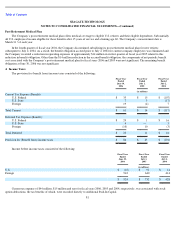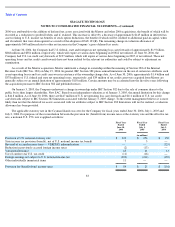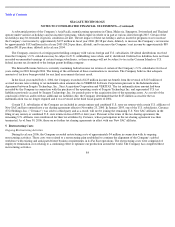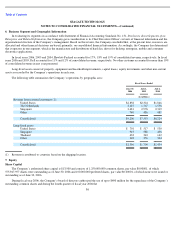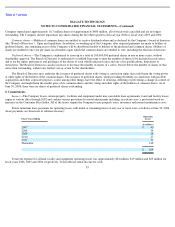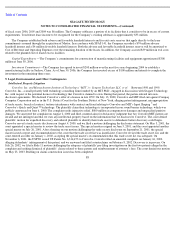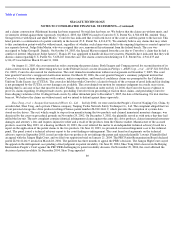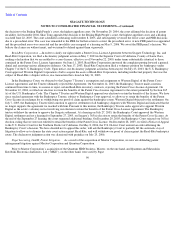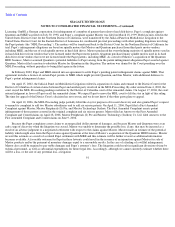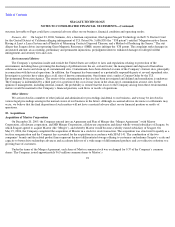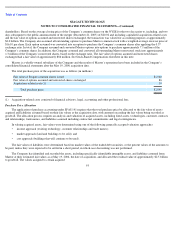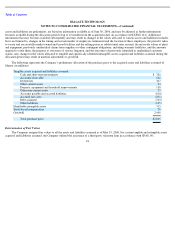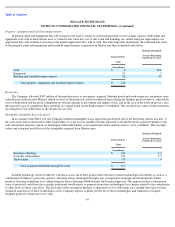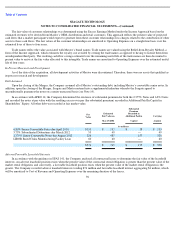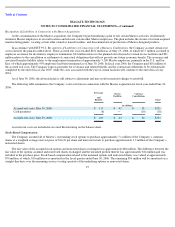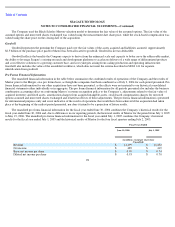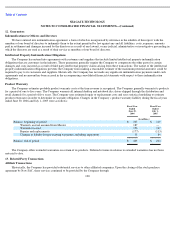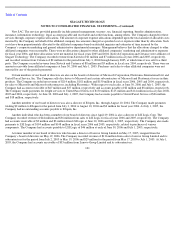Seagate 2005 Annual Report Download - page 93
Download and view the complete annual report
Please find page 93 of the 2005 Seagate annual report below. You can navigate through the pages in the report by either clicking on the pages listed below, or by using the keyword search tool below to find specific information within the annual report.
Table of Contents
SEAGATE TECHNOLOGY
NOTES TO CONSOLIDATED FINANCIAL STATEMENTS—(Continued)
Licensing, GmbH, a German corporation, for infringement of a number of patents that relate to hard disk drives. Papst’s complaint against
Quantum and MKE was filed on July 30, 1998, and Papst’s complaint against Maxtor was filed on March 18, 1999. Both lawsuits, filed in the
United States District Court for the Northern District of California, were transferred by the Judicial Panel on Multidistrict Litigation to the
United States District Court for the Eastern District of Louisiana for coordinated pre-trial proceedings with other pending litigations involving
the Papst patents (the “MDL Proceeding”). The matters will be transferred back to the District Court for the Northern District of California for
trial. Papst’s infringement allegations are based on spindle motors that Maxtor and Quantum purchased from third party motor vendors,
including MKE, and the use of such spindle motors in hard disk drives. Maxtor purchased the overwhelming majority of spindle motors used in
its hard disk drives from vendors that were licensed under the Papst motor patents. Quantum purchased many spindle motors used in its hard
disk drives from vendors that were not licensed under the Papst patents, including MKE. As a result of Maxtor’s acquisition of the Quantum
HDD business, Maxtor assumed Quantum’s potential liabilities to Papst arising from the patent infringement allegations Papst asserted against
Quantum. Maxtor filed a motion to substitute Maxtor for Quantum in this litigation. The motion was denied by the Court presiding over the
MDL Proceeding, without prejudice to being filed again in the future.
In February 2002, Papst and MKE entered into an agreement to settle Papst’s pending patent infringement claims against MKE. That
agreement includes a license of certain Papst patents to MKE which might provide Quantum, and thus Maxtor, with additional defenses to
Papst’s patent infringement claims.
On April 15, 2002, the Judicial Panel on Multidistrict Litigation ordered a separation of claims and remand to the District Court for the
District of Columbia of certain claims between Papst and another party involved in the MDL Proceeding. By order entered June 4, 2002, the
court stayed the MDL Proceeding pending resolution by the District of Columbia court of the remanded claims. On August 17, 2006, the court
entered judgment in favor of Papst on all the remanded claims. We expect Papst to move the MDL court to lift the stay in light of this ruling.
The time for appeal of the District Court’s decision has not yet run, and we do not know if the other party plans to appeal.
On April 10, 2006, the MDL Proceeding judge partially lifted the stay for purposes of focused discovery and also granted Papst’s request
to amend its complaint to add two Maxtor subsidiaries and to add six reissue patents. On April 11, 2006, Papst filed a First Amended
Complaint against Maxtor, Maxtor Peripherals (S) Pte, and Maxtor Technology Suzhou. The First Amended Complaint asserts patent
infringement of those patents asserted in the original complaint and six reissue patents. Maxtor filed an Answer to the First Amended
Complaint and Counterclaims on April 28, 2006. Maxtor Peripherals (S) Pte and Maxtor Technology (Suzhou) Co. Ltd. filed Answers to the
First Amended Complaint and Counterclaims on June 9, 2006.
Because the Papst complaints assert claims to an unspecified dollar amount of damages, and because Maxtor and Quantum were at an
early stage of discovery when the litigation was stayed, Maxtor was unable to determine the possible loss, if any, that may be incurred as a
result of an adverse judgment or a negotiated settlement with respect to the claims against Maxtor. Maxtor made an estimate of the potential
liability which might arise from the Papst claims against Quantum at the time of Maxtor’s acquisition of the Quantum HDD business. Maxtor
revised this estimate as a result of a related Papst settlement with MKE and this estimate will be further revised as additional information
becomes available. A favorable outcome for Papst in these lawsuits could result in the issuance of an injunction against Maxtor for sale of
Maxtor products and/or the payment of monetary damages equal to a reasonable royalty. In the case of a finding of a willful infringement,
Maxtor also could be required to pay treble damages and Papst’s attorney’s fees. The litigation could result in significant diversion of time by
technical personnel, as well as substantial expenditures for future legal fees. Accordingly, although we cannot currently estimate whether there
will be a loss, or the size of any potential loss, a litigation
91


